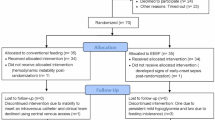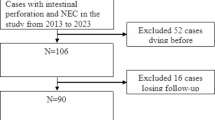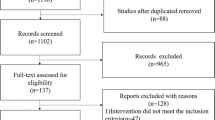Abstract
Objective
To study the effects of rapid enteral feed advancement with early feed fortification in stable very low birth weight (VLBW) infants >30 weeks gestation.
Study design
Preterm infants (N = 92) were randomized to a) rapid feed advancement-early fortification - REF group (enteral feed advanced at 25–30 ml/kg/day, fortification at 50 ml/kg/day) or b) slow feed advancement-late fortification-SLF group (feed advanced at 15–20 ml/kg/day, fortification at 100 ml/kg/day).
Results
The primary outcome-time to regain birth weight was significantly lower in REF group (9 days vs 13 days, P = 0.02). REF group reached full enteral feeds earlier (6 days vs 9 days, P = 0.001), had lower rates of sepsis (13% vs 38%, P = 0.007) and shorter hospital stay (10 days vs 15 days, P = 0.01). At one year, the median Z-scores for weight [−1.5 vs −2.2, P < 0.001] and head circumference [1.1 vs 0, P < 0.001) were significantly higher in the REF group.
Conclusions
In VLBW preterm infants >30 weeks, rapid feed advancement with early fortification resulted in early postnatal regain of birth weight with positive effects on growth at one year.
This is a preview of subscription content, access via your institution
Access options
Subscribe to this journal
Receive 12 print issues and online access
$259.00 per year
only $21.58 per issue
Buy this article
- Purchase on SpringerLink
- Instant access to the full article PDF.
USD 39.95
Prices may be subject to local taxes which are calculated during checkout



Similar content being viewed by others
Data availability
Data are presented in this paper and in the online supplementary material. Correspondence and requests for data should be addressed to Anitha Ananthan.
References
Embleton NE, Pang N, Cooke RJ. Postnatal malnutrition and growth retardation: an inevitable consequence of current recommendations in preterm infants? Pediatrics. 2001;107:270–73.
Ehrenkranz RA, Das A, Wrage LA, Poindexter BB, Higgins RD, Stoll BJ, et al. Early nutrition mediates the influence of severity of illness on extremely LBW infants. Pediatr Res. 2011;69:522–29.
Senterre T, Rigo J. Reduction in postnatal cumulative nutritional deficit and improvement of growth in extremely preterm infants. Acta Paediatr. 2012;101:e64–e70.
Beauport L, Schneider J, Faouzi M, Hagmann P, Hüppi PS, Tolsa J-F, et al. Impact of early nutritional intake on preterm brain: a magnetic resonance imaging study. J Pediatr. 2017;181:29–36.e1.
dit Trolli SE, Kermorvant-Duchemin E, Huon C, Bremond-Gignac D, Lapillonne A. Early lipid supply and neurological development at one year in very low birth weight (VLBW) preterm infants. Early Hum Dev. 2012;88:S25–S29.
Oddie SJ, Young L, McGuire W. Slow advancement of enteral feed volumes to prevent necrotising enterocolitis in very low birth weight infants. Cochrane Database Syst Rev. 2021;8:CD001241.
Shah SD, Dereddy N, Jones TL, Dhanireddy R, Talati AJ. Early versus delayed human milk fortification in very low birth weight infants–a randomized controlled trial. J Pediatr. 2016;174:126–31.e1.
Salas AA, Gunawan E, Nguyen K, Reeves A, Argent V, Finck A, et al. Early human milk fortification in infants born extremely preterm: a randomized trial. Pediatrics. 2023;152:e2023061603.
Thanigainathan S, Abiramalatha T. Early fortification of human milk versus late fortification to promote growth in preterm infants. Cochrane Database Syst Rev. 2020;7:CD013392.
Bora R, Murthy NB. In resource limited areas complete enteral feed in stable very low birth weight infants (1000-1500 g) started within 24 h of life can improve nutritional outcome. J Matern Fetal Neonatal Med. 2017;30:2572–77.
Murki S, Vardhelli V, Deshabhotla S, Sharma D, Pawale D, Kulkarni D, et al. Predictors of length of hospital stay among preterm infants admitted to neonatal intensive care unit: Data from a multicentre collaborative network from India (INNC: Indian National Neonatal Collaborative). J Paediatr Child Health. 2020;56:1584–89.
Lee HC, Bennett MV, Schulman J, Gould JB, Profit J. Estimating Length of Stay by Patient Type in the Neonatal Intensive Care Unit. Am J Perinatol. 2016;33:751–7.
Travers CP, Wang T, Salas AA, Schofield E, Dills M, Laney D, et al. Higher- or Usual-Volume Feedings in Infants Born Very Preterm: A Randomized Clinical Trial. J Pediatr. 2020;224:66–71.
Gao C, Ehsan L, Jones M, Khan M, Middleton J, Vergales B, et al. Time to regain birth weight predicts neonatal growth velocity: A single-center experience. Clin Nutr ESPEN. 2020;38:165–71.
Vesel L, Bellad RM, Manji K, Saidi F, Velasquez E, Sudfeld CR, et al. Feeding practices and growth patterns of moderately low birthweight infants in resource-limited settings: results from a multisite, longitudinal observational study. BMJ Open. 2023;13:e067316.
Walsh MC, Kliegman RM. Necrotizing enterocolitis: treatment based on staging criteria. Pediatr Clin North Am. 1986;33:179–201.
Fenton TR, Kim JH. A systematic review and meta-analysis to revise the Fenton growth chart for preterm infants. BMC Pediatr. 2013;13:1–13.
WHO child growth standards: length/height-for-age, weight-for-age, weight-for-length, weight-for-height and body mass index-for-age: methods and development. World Health Organization; 2006.
Perrem L, Semberova J, O’Sullivan A, Kieran EA, O’Donnell CP, White MJ, et al. Effect of early parenteral nutrition discontinuation on time to regain birth weight in very low birth weight infants: a randomized controlled trial. J Parenter Enter Nutr. 2019;43:883–90.
Razzaghy J, Shukla VV, Gunawan E, Reeves A, Nguyen K, Salas AA. Early and exclusive enteral nutrition in infants born very preterm. Arch Dis Child Fetal Neonatal Ed. 2024;109:378–83.
Sullivan S, Schanler RJ, Kim JH, Patel AL, Trawöger R, Kiechl-Kohlendorfer U, et al. An exclusively human milk-based diet is associated with a lower rate of necrotizing enterocolitis than a diet of human milk and bovine milk-based products. J Pediatr. 2010;156:562–67.e1.
Alizadeh Taheri P, Sajjadian N, Asgharyan Fargi M, Shariat M. Is early breast milk fortification more effective in preterm infants?: a clinical trial: Early and late fortification. J Perinat Med. 2017;45:953–57.
Wynter Z, Gorham JA, Thompson AB, Mundy C, Waller JL, Stansfield BK. Immediate fortification of human milk with a bovine milk-derived human milk fortifier in very low birth weight infants: a randomized clinical trial. J Perinatol. 2024. https://doi.org/10.1038/s41372-024-01998-0.
Yang WC, Fogel A, Lauria ME, Ferguson K, Smith ER. Fast Feed Advancement for Preterm and Low Birth Weight Infants: A Systematic Review and Meta-analysis. Pediatrics. 2022;150:e2022057092G.
Lee AC, Katz J, Blencowe H, Cousens S, Kozuki N, Vogel JP, et al. National and regional estimates of term and preterm babies born small for gestational age in 138 low-income and middle-income countries in 2010. Lancet Glob Health. 2013;1:e26–36.
Vizzari G, Morniroli D, Tiraferri V, Macchi M, Gangi S, Consales A, et al. Postnatal growth of small for gestational age late preterm infants: determinants of catch-up growth. Pediatr Res. 2023;94:365–70.
Fenton TR, Chan HT, Madhu A, Griffin IJ, Hoyos A, Ziegler EE, et al. Preterm infant growth velocity calculations: a systematic review. Pediatrics. 2017;139:e20162045.
Alburaki W, Yusuf K, Dobry J, Sheinfeld R, Alshaikh B. High early parenteral lipid in very preterm infants: a randomized-controlled trial. J Pediatr. 2021;228:16–23. e1
Flannery DD, Jensen EA, Tomlinson LA, Yu Y, Ying G-S, Binenbaum G. Poor postnatal weight growth is a late finding after sepsis in very preterm infants. Arch Dis Child Fetal Neonatal Ed. 2021;106:298–304.
Stoll BJ, Hansen NI, Adams-Chapman I, Fanaroff AA, Hintz SR, Vohr B, et al. Neurodevelopmental and growth impairment among extremely low-birth-weight infants with neonatal infection. JAMA. 2004;292:2357–65.
Lim J, Yoon SJ, Shin JE, Han JH, Lee SM, Eun HS, et al. Growth failure of very low birth weight infants during the first 3 years: A Korean neonatal network. PLoS One. 2021;16:e0259080.
Sahu TK, Manerkar S, Mondkar J, Kalamdani P, Patra S, Kalathingal T, et al. Effect of early total enteral feeding vs incremental feeding in small for gestational age very low birth weight infants: A randomized controlled trial. J Neonatal Perinat Med. 2024;17:225–32.
Nangia S, Vadivel V, Thukral A, Saili A. Early total enteral feeding versus conventional enteral feeding in stable very-low-birth-weight infants: a randomised controlled trial. Neonatology. 2019;115:256–62.
Barker D. Developmental origins of adult health and disease. J Epidemiol Community Health. 2004;58:114.
Acknowledgements
The authors thank the Dean, Dr Sangeeta Ravat for permitting to publish the manuscript.
Author information
Authors and Affiliations
Contributions
Anitha Ananthan: Writing–review & editing, Supervision, Methodology, Formal analysis, Conceptualization. Ganesh Bhatkar: Writing– original draft, Methodology, Formal analysis, Data curation. Haribalakrishna Balasubramanian: Writing–review and editing, Formal analysis, conceptualization. Muthu Vijayanathan: Methodology, Data curation. Lakshmi Srinivasan: Writing– review & editing, Validation.
Corresponding author
Ethics declarations
Competing interests
The authors declare no competing interests.
Ethics approval and consent to participate
The study was approved by the Institutional Ethics Committee and participants were enrolled after obtaining written informed consent. The study was conducted as per the Declaration of Helsinki. All methods were performed in accordance with the relevant guidelines and regulations.
Additional information
Publisher’s note Springer Nature remains neutral with regard to jurisdictional claims in published maps and institutional affiliations.
Supplementary information
Rights and permissions
Springer Nature or its licensor (e.g. a society or other partner) holds exclusive rights to this article under a publishing agreement with the author(s) or other rightsholder(s); author self-archiving of the accepted manuscript version of this article is solely governed by the terms of such publishing agreement and applicable law.
About this article
Cite this article
Ananthan, A., Bhatkar, G., Balasubramanian, H. et al. Effects of rapid enteral feed advancement with early human milk fortification in very low birth weight preterm infants > 30 weeks gestation in a resource limited setting- a randomized controlled trial. J Perinatol 45, 650–656 (2025). https://doi.org/10.1038/s41372-024-02164-2
Received:
Revised:
Accepted:
Published:
Version of record:
Issue date:
DOI: https://doi.org/10.1038/s41372-024-02164-2



